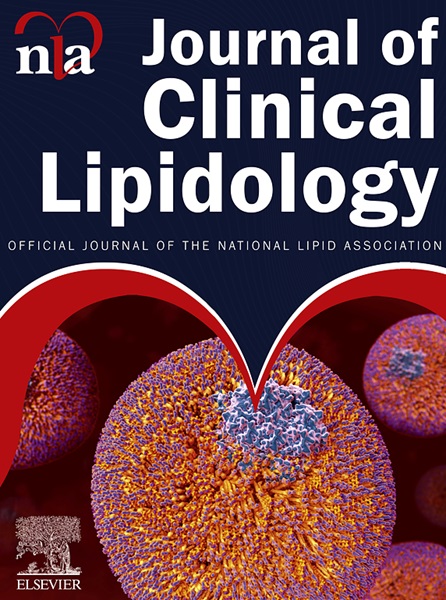成人发病甚长链酰基辅酶A脱氢酶缺乏症1例报告
IF 3.6
3区 医学
Q2 PHARMACOLOGY & PHARMACY
引用次数: 0
摘要
甚长链酰基辅酶a脱氢酶缺乏症(VLCAD)是一种罕见的常染色体隐性脂质疾病,由ACADVL基因的双等位致病变异引起,导致脂肪酸代谢受损。本报告提出了一个令人信服的病例VLCAD诊断在成年期。目的/目的在此,我们报告一例罕见的常染色体隐性脂质疾病VLCAD合并高脂血症的病例。方法:病例介绍:一名35岁女性因低密度脂蛋白水平升高而被转介到血脂诊所。病史健康,在过去的5-6年里,她开始出现反复发作的横纹肌溶解,需要住院治疗。进一步的评估显示多种维生素和矿物质缺乏,包括维生素D、叶酸、钴胺素和铁。值得注意的是,没有过早动脉粥样硬化性心血管疾病的家族史。实验室结果显示总胆固醇276毫克/分升,甘油三酯63毫克/分升,高密度脂蛋白56毫克/分升,低密度脂蛋白207毫克/分升。基因检测在ACADVL基因中发现了一个C . 848t >C (p.Val283Ala)致病变异和一个C .938_940del (p.p asp313del)未知变异。心脏评估,包括心电图和经胸超声心动图,显示窦性心律正常,双心室大小和功能正常,无明显的瓣膜疾病。结果患者开始接受中链甘油三酯(MCT)替代治疗,并调整饮食,增加蛋白质和纤维,同时减少脂肪摄入。她最初每天服用三次大约20毫升的MCT,占她每日热量摄入的22%。然而,她经历了严重的恶心、呕吐和腹胀,这限制了她对治疗的坚持。结论本病例说明了成年期VLCAD诊断的复杂性以及由于副作用而管理治疗的挑战。需要进一步的研究来探索VLCAD的其他治疗选择。本文章由计算机程序翻译,如有差异,请以英文原文为准。
Adult onset very long chain acyl-CoA dehydrogenase deficiency: A case report
Background/Synopsis
Very long chain acyl-CoA dehydrogenase deficiency (VLCAD) is a rare autosomal recessive lipid disorder caused by biallelic pathogenic variants in the ACADVL gene, leading to impaired fatty acid metabolism. This report presents a compelling case of VLCAD diagnosed in adulthood.
Objective/Purpose
Here, we present an interesting case with VLCAD, a rare autosomal recessive lipid disorder, and hyperlipidemia.
Methods
Case Presentation: A 35-year-old woman was referred to the lipid clinic due to elevated LDL levels. Historically healthy, she began experiencing recurrent episodes of rhabdomyolysis requiring hospitalization over the last 5-6 years. Further evaluations revealed multiple vitamin and mineral deficiencies, including vitamin D, folic acid, cobalamin, and iron. Notably, there was no family history of premature atherosclerotic cardiovascular disease. Laboratory results indicated total cholesterol of 276 mg/dL, triglycerides of 63 mg/dL, HDL of 56 mg/dL, and LDL of 207 mg/dL. Genetic testing identified a c.848T>C (p.Val283Ala) pathogenic variant and a c.938_940del (p.Asp313del) variant of unknown significance in the ACADVL gene. Cardiac assessments, including EKG and transthoracic echocardiogram, revealed normal sinus rhythm and normal biventricular size and function without significant valvular disease.
Results
The patient was initiated on medium-chain triglyceride (MCT) replacement therapy and adjusted her diet to increase protein and fiber while reducing fat intake. She was initially tolerating approximately 20 mL of MCT three times daily, constituting 22% of her daily caloric intake. However, she experienced severe nausea, vomiting, and bloating, which limited her adherence to the treatment.
Conclusions
This case illustrates the complexities of diagnosing VLCAD in adulthood and the challenges in managing treatment due to side effects. Further research is warranted to explore additional therapeutic options for VLCAD.
求助全文
通过发布文献求助,成功后即可免费获取论文全文。
去求助
来源期刊
CiteScore
7.00
自引率
6.80%
发文量
209
审稿时长
49 days
期刊介绍:
Because the scope of clinical lipidology is broad, the topics addressed by the Journal are equally diverse. Typical articles explore lipidology as it is practiced in the treatment setting, recent developments in pharmacological research, reports of treatment and trials, case studies, the impact of lifestyle modification, and similar academic material of interest to the practitioner.
Sections of Journal of clinical lipidology will address pioneering studies and the clinicians who conduct them, case studies, ethical standards and conduct, professional guidance such as ATP and NCEP, editorial commentary, letters from readers, National Lipid Association (NLA) news and upcoming event information, as well as abstracts from the NLA annual scientific sessions and the scientific forums held by its chapters, when appropriate.

 求助内容:
求助内容: 应助结果提醒方式:
应助结果提醒方式:


